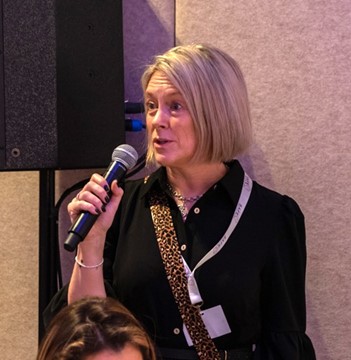Here, Arlene Wilkie, SAFE Director General reflects on the success of the recent event European Life After Stroke Forum in bringing together stroke survivors, healthcare professionals, academics and stroke support organisations shining a spotlight on life after stroke issues across Europe.

Arlene Wilkie,
SAFE Director General
Our first in-person European Life After Stroke Forum, was held in Barcelona on Friday 10 March 2023. We have been planning this event for the last three years, since we set up the European Life After Stroke Forum in 2019. Its aim is to shine a spotlight on this neglected area of the stroke care pathway, a vehicle to raise the profile and interest in life after stroke care and support and to give it equal status with acute care and rehabilitation. The reality supports this focus. Stroke survivors tell us that they often feel abandoned – even though stroke is the biggest cause of adult disability in Europe and can affect all aspects of day-to-day life. We know there are about nine million people living with stroke in Europe and this figure is predicted to increase to 12 million by 2040, causing an ever-increasing burden on health, social care, families and carers.
We are pleased that life after stroke is recognised as a key area in the Stroke Action Plan for Europe and in WSO’s Global Policy Priorities. The need for this recognition has been further underlined in our report ‘A life saved is a life worth living – the unmet needs of stroke survivors in Europe’ launched at the Forum. The report is a comprehensive review and analysis by King’s College London of all the research on the needs and unmet needs of stroke survivors. It reveals that the long-term support to meet the needs of stroke survivors in Europe is severely lacking.
Even basic things like access to ongoing rehabilitation or mental health support is a constant struggle for people who have had a stroke. All too often service provision and support stop a few weeks after someone has a stroke, but their needs persist. The review found over 80 distinct issues, where stroke survivors have said that their needs are not being met: from the need for ongoing physiotherapy to promote mobility; or psychological support to help prevent depression. The report also covered the need for better inclusion in social and community life and highlighted the often-overlooked needs of informal carers.
“In my long-term, still ongoing, recovery I have a strong need for continued physiotherapy and occupational therapy. It goes without saying that for this to happen there is a need for financial resources.”
Jurg
Stroke survivor, Switzerland
Some of these issues were given much needed attention during the European Life After Stroke Forum. Topics included: driving after stroke; creating services and a community where people live life well after stroke; intimacy, relationships and sexual wellbeing after stroke; physical activity after stroke; and preventing recurrent stroke.
It will be European Stroke Awareness Day on Tuesday 9 May 2023, when we will use this opportunity to advocate for more research and focus on life after stroke.
Arlene Wilkie,
SAFE Director General